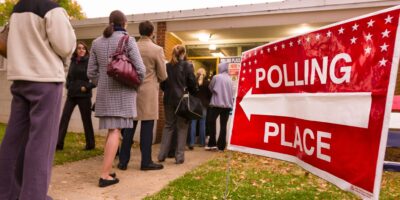Judge Strikes Down LA County Outdoor Dining Ban

Los Angeles County and California, in general, have been subject to some of the longest and most arbitrary lockdown orders in the country. California Governor Gavin Newsom waived the state’s restrictions on the length of public health emergencies on March 4th which allowed him to never officially end his lockdowns. Since then, residents have been subject to ever-changing rules that shift at the will of those in power. In Los Angeles, there was a rare moment of principled resistance as a Superior Court judge struck down a recent and controversial outdoor dining ban. Unfortunately for Los Angeles residents, Governor Newsom recently declared a regional stay at home order which in practice bans outdoor dining. This is of course, the same governor who was recently spotted at a dinner party at the Michelin-starred French Laundry.
Although it is unfortunate that LA County residents will not be able to reap the benefits of the judge’s ruling, the development is still a fortunate one that may signal a growing acceptance of legal theories that challenge lockdowns.
The Context
Los Angeles County could have been in competition with the state of California for the most aggressive and arbitrary lockdown policies. The most destructive and frustrating being its flip-flopping on reopening restaurants. Society performs best when the rules are consistent and reasonable, not erratic and arbitrary. Eater describes the confusing and chaotic nature in which Los Angeles issues dining regulations when it writes,
“LA County is likely close to being able to reopen indoor dining at 25 percent capacity, but the data shown by county officials over the next few weeks will tell the full story. Unfortunately, government officials have not been great about giving advanced (sic) notice to businesses like restaurants (or hair and nail salons, gyms, or anyone else) to help them ease back into reopening safely. That means when the announcement comes in some upcoming public press conference, indoor dining could be allowed immediately, just like in late May.”
This statement was of course written in September and in November Eater reported that Los Angeles restaurants were likely to be restricted to outdoor dining for weeks if not months. Restaurants made the necessary investments to prepare for a prolonged period of outdoor dining. Then in a sudden and heartbreaking development, the LA County Board of Supervisors decided in a controversial 3-2 vote to ban outdoor dining at the end of November. Such a policy was met with intense criticism as it not only condemned countless restaurants to devastation but it went against the accepted science behind the safety of outdoor dining. Meanwhile, other businesses such as the film industry were allowed to stay open and provide outdoor dining venues for their employees.
Justice
On December 8th Politico reported that
“A judge on Tuesday issued a blistering rebuke to Los Angeles County public health officials racing to control Covid-19’s spread, saying an indefinite ban on outdoor dining announced late last month was “unsupported by any findings” and an abuse of emergency powers.”
Such a ruling is of course correct because restrictions must not be arbitrary and must be backed by some sort of rationale. Banning outdoor dining but allowing other businesses to stay open and even permitting their employees to eat together outdoors is not in any way a consistent policy. Restricting outdoor dining, or any social activity for that matter, just because those in charge feel like mandating it is not only a terrible way to run a society, it is also illegal.
Politico provides the following quote on the matter
“The Restaurant Closure Order is an abuse of the Department’s emergency powers, is not grounded in science, evidence, or logic, and should be adjudicated to be unenforceable as a matter of law,” wrote Los Angeles Superior Court Judge James C. Chalfant in a tentative ruling issued Tuesday to a legal challenge from the California Restaurant Association.”
LAist writes the following
“The plaintiff, the California Restaurant Association, asserted that because L.A. County officials have not proven a connection between outdoor restaurant dining and COVID-19 transmission, the outdoor dining ban is “arbitrary and capricious,” a phrase that got tossed around a lot at today’s hearing.”
The judicial branch exists for this exact reason, and that is enforcing the constitutional guidelines that preserve a structure of good government. If laws cannot pass a threshold of constitutionality and directionality, then they are not legitimate. Judge Chalfant’s ruling affirms that and demonstrates a level of reasonable thinking surrounding lockdown policies. This is that politicians do not get to become dictators just because we are in a pandemic.
Further Implications
The ruling is one of a number of developments that join a growing club of judicial victories against lockdowns. Recently, religious groups in New York won a massive victory in the US Supreme Court against restrictions on their rights to attend indoor service. The governors of Michigan, Wisconsin, and Pennsylvania all had their lockdowns struck down by the courts in the past few months.
This is all significant because it represents a growing legal case against lockdowns that may be becoming more widely accepted. In September, I outlined some of the basic legal avenues against lockdowns and the legal framework that public health interventions are supposed to follow. Lockdowns have clearly violated many Constitutional rules, but one of the main roadblocks to legal victories could be that we didn’t know enough about the virus to determine what rules are narrowly tailored. Law professor Ilya Somin writes in The Volokh Conspiracy that
“No judge will want to be seen as impeding an effort to save large numbers of lives in the midst of a grave menace to public health.”
Courts have often been deferential to a variety of seemingly unconstitutional laws because of this desire to not impede the public interest. Sometimes this is because of a judge’s judicial philosophy and sometimes it can be because we don’t know enough to make a decision on whether policies are appropriate. This was certainly true at the beginning of the pandemic where the science was still being investigated and we knew very little about the virus. The fact that a number of judges have felt comfortable striking down lockdowns may be a product of our growing understanding of what policies work or do not work.
Legal scholar Ilya Shapiro writes that
“As the facts on the ground change, government actions that once were grudgingly accepted now simply don’t pass the constitutional smell test. That’s especially so given the fundamental error that was made in ordering shutdowns based on arbitrary definitions of “essentiality,” as opposed to issuing rules according to the safety of various activities.”
According to rules set forth by the Police Power and legal precedent set by cases such as Jacobson v. Massachusetts, policies that curtail rights must be narrowly tailored and not be overly broad or arbitrary. At the beginning of the pandemic, lockdowns may have passed this legal test because it was unclear how dangerous the virus was or what policies worked. The courts likely gave lockdowns an initial pass because of how little we knew at the moment and a general apprehension about interfering with a public health response.
The recent Los Angeles County ruling may be the most recent sign that judges are becoming increasingly comfortable with applying the law to lockdowns. This is not only because we know more about the virus, but also because we have now seen firsthand the damage these policies have done to society while providing little benefit in return.










